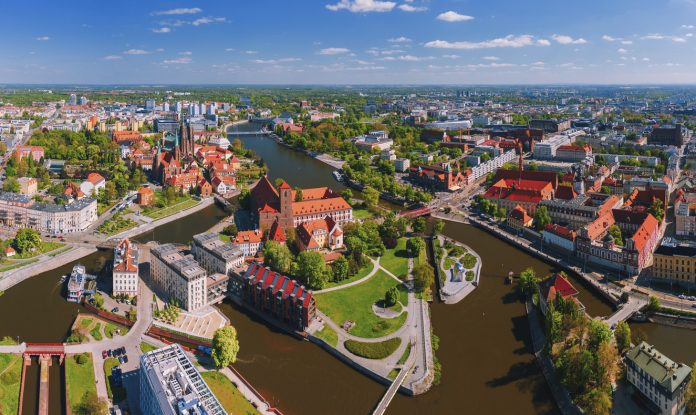Jakub Mazur, Deputy Mayor of Wrocław, Poland, and a member of ICLEI Europe’s Regional Executive Committee, discusses innovative food security policies, including how Wrocław is shaping a resilient future through food
The sudden movement of three million Ukrainian refugees to Poland following the war in Ukraine and the floods that impacted Poland’s southwest in the autumn of 2024 are only the latest examples of the multiple crises that cities in Poland must face. The City of Wrocław is mobilising resources to prepare for any situation that climate change, political conflicts, and pandemics might bring.
But how can a city prepare for a crisis situation? We see sustainable urban development as a key towards a resilient future, and an important factor in this is food security. Building on the European Union’s (EU) sustainability framework – particularly the Farm to Fork strategy – Wrocław is developing its first-ever urban food policy. Our goal is to enhance food security for all residents – ensuring that everyone has sufficient access to safe, nutritious, and culturally appropriate food – even in times of crisis.
In 2022, the City of Wrocław saw firsthand the importance of being prepared while having a support system in place and counting on the support, involvement and cooperation of non-governmental organisations, local activity centres and residents. We welcomed large numbers of refugees from Ukraine and took charge of ensuring everyone in the city could access food with dignity in a moment of crisis. The same year, the city received a special mention at the Milan Pact Awards for its efforts.
Access to affordable and healthy food has been a major topic of conversation during meetings with residents over the past three years. These multi-stakeholder dialogues, together with initial discussions about the importance of having a food and resilience strategy in the city, led to the development of a Fair Local Green Deal around food. These conversations resulted in the city prioritising food as part of its work and helped align Wrocław’s priorities and policies with the EU level to establish more just and efficient pathways and collaboration. Our city’s commitment to food is also exemplified by Wrocław’s Food Manifesto, which was presented at a conference on food in October 2024.
Miejska Farma: A model for strengthening food security
Food security is also about adapting to future climatic and environmental conditions for food production. For this reason, Wrocław has set up Miejska Farma (City-Farm), the first urban organic farm in Poland where food production for the city’s consumption is combined with an inclusion and training programme for people searching for employment. The farm produces 70 tonnes of food annually, used in the 16 public kindergartens that are part of the Wrocław Nursery Complex.
It is also an example of the partnerships needed to run such an interdisciplinary project. The City’s Division of Climate and Energy manages the farm in collaboration with Wrocław University. It cooperates with six additional organisations to manage the different parts of the operation – from hiring workers, i.e., people at risk of social exclusion, to the distribution of the harvest and the on- and off-site educational activities.
Food security: The power of city collaborations
Food security is not a challenge that can be solved in isolation, which is why partnerships that involve strong cross-city cooperation, and efforts to bring food to the forefront of the policy arena, are valued at all levels.
Cities have the tools we need to work on food systems, while EU frameworks support the collaboration and alignment between local, national, and European levels. However, national governments must create the right framework to enable cities and communities to work on sustainable food systems for greater food security and resilience.
This is why Wrocław and many other cities and towns have signed the Aalborg Conditions. These clearly state the enabling conditions local governments need now to take effective action towards a climate-neutral, just, and resilient Europe. In Poland, Wrocław, Warsaw, and Krakow are joining forces to advance the development of urban food policies and leverage change in national legislation in this regard.
Wrocław is a member of the European ICLEI network, which brings together local governments for sustainability, and has participated in many EU-funded projects, several of which provided the needed impetus to start the city’s work on sustainable food systems – Foodshift2030, NetworkNature, FoodTrails, and now FoodCLIC. These activities and partnerships help create an interdisciplinary network of people working across an array of interconnected topics that will help to build a food community in Wrocław.
Food-related priorities in local politics
While Wrocław has been working on sustainable city development for years, we are still just getting started, and there is still much good work to do. For instance, dialogue with our national policymakers that could enable policy alignment, such as allowing the sale of fruit and vegetables from urban production areas to school canteens, is currently one of several food-related priorities in local politics.
We are also looking to create partnerships in rural areas in the region so that municipalities of all sizes can work collaboratively to facilitate market accessibility (for new opportunities), foster shorter supply chains, and ensure food security and a vibrant future for all.
It is worth including another important context in our thinking. From the perspective of a metropolis, we have to ensure and value symbiosis and synergy between urban and rural areas. As the President of the METREX European Network of Metropolitan Regions and Areas, I see a huge opportunity here for Wrocław and other European metropolises.











